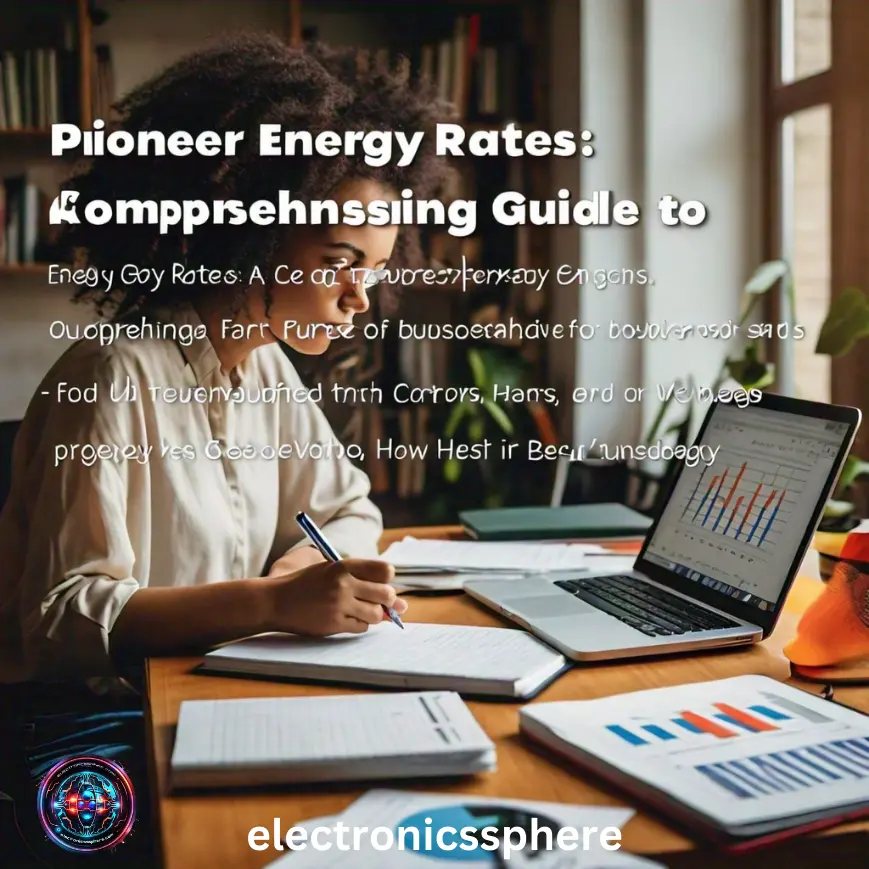Understanding Pioneer Energy Rates and Your Options
Energy rates are a crucial part of budgeting for both households and businesses. For those who live in regions served by Pioneer Energy, understanding the available energy plans, their pricing structures, and the options they provide can help you make an informed decision about your electricity and natural gas usage.
In this guide, we’ll take a detailed look at Pioneer Energy rates, explore different plan types, and provide insights on how to choose the best option for your needs.
What is Pioneer Energy?
Pioneer Energy offers natural gas and power solutions to clients. From modest residential houses to huge business enterprises, they are renowned for providing various tariff programs that suit various energy consumers.
Market factors, fuel prices, and regulatory policies all impact Pioneer Energy’s rates. They want to satisfy many customer needs and provide sustainable energy solutions and varied rate options.

Key Offerings by Pioneer Energy:
Pioneer Energy offers a range of plans, including green energy, variable-rate, and fixed-rate electricity plans, providing you with the flexibility to choose the best option for your needs and preferences.
- Provides natural gas services for homes and businesses.
- Options for consumers wishing to lessen their carbon footprint in renewable energy.
- Special pricing for both small and large enterprises is available with commercial plans.
Types of Pioneer Energy Plans
Fixed-Rate Plans
Typically lasting between 12 and 36 months, fixed-rate agreements provide customers with a consistent cost per kWh or therm. These programs are perfect for clients who want assurance that their tariffs will never change despite changes in the energy market.
Fixed-rate plan advantages include:
Price Stability: Regardless of market price spikes, the rate stays fixed for the duration of the contract, so there are no unpleasant surprises when you receive your monthly statement.
Budgeting for the long term: You can make more financial plans since your energy expenses are fixed.
Negative aspects
Reduced Flexibility: You won’t be able to benefit from cheaper costs if market rates drop without having to pay an early termination fee (ETF) to move plans. However, if you find a better plan with us or another provider, we can guide you through the process of switching without any hassle.
Variable-Rate Plans
Monthly-to-month or variable-rate agreements let your electricity rate change in response to market fluctuations. For that reason, you may experience cheaper rates when demand is low and abrupt rises when demand is strong.
Advantages of Plans with Variable Rates:
Flexibility: You can change providers or plans anytime without being charged an early termination fee because you are not tied into a long-term agreement.
With variable-rate plans, you have the potential to save on your monthly expenses if market prices decline, giving you a reason to be optimistic about your energy costs.
Negative aspects
Amount Volatility: Your rates may increase suddenly, especially during peak demand, such as the winter or summer.
Green Energy Plans
Green energy plans, such as those powered by solar and wind energy, are provided by Pioneer Energy to ecologically conscientious customers. With these plans, customers can lower their carbon footprint and promote the development of renewable energy sources, which frequently have higher costs.
Green energy plans’ advantages
By choosing green energy plans, you’re not just reducing your carbon footprint; you’re also contributing to reducing greenhouse gas emissions, a choice you can be proud of.
Enduring Sustainability: Opting for renewable energy contributes to the shift towards a future with more sustainable energy sources.
Negative aspects
Maybe Higher Costs: Plans utilizing green energy may occasionally come with a small price increase over those utilizing conventional fossil fuels.
Business and Commercial Energy Plans
Aside from that, Pioneer Energy provides businesses with customized pricing. Small companies, large corporations, and industrial facilities have different energy consumption needs, and these strategies address those needs. Pioneer Energy may provide customized plans to fulfill particular operational requirements. Because businesses consume more energy, their rates are typically lower. Good Charlie energy also provides these services.
Features of Energy Plans for Businesses:
Reduced Rates: Businesses frequently pay energy providers a cheaper per-unit rate than homes.
Tailored Solutions: To assist businesses in controlling their energy consumption, Pioneer Energy offers specialized energy solutions, including demand response plans and energy-saving suggestions such as using energy-efficient appliances and adjusting thermostat settings.
Natural Gas Plans
Pioneer Energy provides natural gas, in addition to electricity, to its commercial and residential clients. Like electricity, customers can select the natural gas plan that fits their needs by choosing from fixed-rate and variable-rate alternatives.
Natural Gas Fixed-Rate Plans:
- To protect yourself from market instability, stable prices lock in a rate for a specific time.
Natural Gas Variable-Rate Plans:
- Rates based on market pricing are market-based, meaning price increases can occur during periods of high demand. Still, there is also the possibility of savings during lower demand.
Understanding Pioneer Energy Rates
The standard units of measurement for energy rates are cents per them for natural gas and cents per kWh for electricity. Your location, the type of plan you have, and the energy you use all affect the cost you pay.
Factors That Affect Pioneer Energy Rates:
Market Demand: Rates may increase in high-demand seasons, such as the summer, when air conditioning demand peaks, or the winter, when energy expenses soar.
The fuel price, which includes coal, natural gas, and renewable energy sources, directly impacts energy rates.
State and federal laws, such as taxes, tariffs, and energy subsidies, may impact energy prices.
Energy Source: Energy plans that use renewable energy may have marginally higher rates than fossil fuels because of their differing pricing structures.
Pioneer Energy Rate Table Example
| Plan Type | Term | Rate (¢/kWh) | Energy Source |
|---|---|---|---|
| Fixed-Rate Plan | 12 months | 10.5¢/kWh | Mixed |
| Fixed-Rate Plan (Green) | 12 months | 12.2¢/kWh | 100% Renewable |
| Variable-Rate Plan | Month-to-month | 9.8¢/kWh | Mixed |
| Commercial Fixed-Rate Plan | 24 months | 8.9¢/kWh | Mixed |
| Natural Gas Fixed-Rate Plan | 24 months | 85¢/therm | Fossil Fuel |
| Natural Gas Variable Plan | Month-to-month | 90¢/therm | Fossil Fuel |
Renewable Energy Rate Table
| Plan Type | Term | Rate (¢/kWh) | Energy Source |
|---|---|---|---|
| Green Energy Fixed-Rate Plan | 12 months | 12.5¢/kWh | Wind & Solar |
| Green Energy Variable Plan | Month-to-month | 11.9¢/kWh | Wind & Solar |
| Solar Buy-Back Plan | 12 months | 13.0¢/kWh | Solar + Buy-back |
How to Choose the Best Pioneer Energy Plan
To make sure you’re choosing the best Pioneer Energy plan for your home or place of business, it’s crucial to take into account a few factors:
Energy Use: Consider the amount of natural gas and electricity you use. Fixed-rate plans stabilize bigger households, while variable-rate plans may be more advantageous for small homes and apartments.
Budget: Stable monthly payments from a fixed-rate plan help you prevent unpleasant surprises. A variable-rate plan, however, can save you money during off-peak hours if you’re okay with some swings.
Duration of Contract: Determine how long you intend to remain where you are now. Securing a reduced fixed rate for 24 or 36 months may prove advantageous if you want to stay put. A variable or shorter-term strategy provides flexibility if you’re unsure or intend to move.
Renewable Energy: You might choose a green energy plan if you value sustainability. These initiatives support renewable energy projects and lessen dependency on fossil fuels, even though they could be a little more expensive.
Company Requirements: Commercial users must assess their company’s energy usage trends. Custom business plans from Pioneer Energy can save money by introducing energy-efficient solutions or coordinating energy usage with off-peak prices.
Conclusion
Whether you run a business, rent a house, or a tenant, selecting the appropriate energy plan is crucial. Fixed-rate, variable-rate, and renewable energy plans are just a few of Pioneer Energy’s alternatives to cater to all customer types.
You may select the finest plan to suit your requirements and assist in efficiently managing your energy expenditures by considering variables like energy use, budget, and environmental impact.
Pioneer Energy remains a top option for those searching for dependable and reasonably priced energy solutions due to its cheap rates, adaptable plan options, and dedication to renewable energy.
You can easily find the finest energy bargain for your house or place of business by taking the time to investigate the various plans and rates that are offered.






One Comment